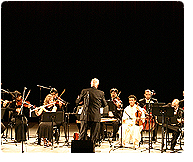|
|
 |
 Exploding Zithers and Musical Diplomacy: How a Moroccan, an Israeli, and a Palestinian Seek A New Vision Through Music
Exploding Zithers and Musical Diplomacy: How a Moroccan, an Israeli, and a Palestinian Seek A New Vision Through Music
Hicham Chami’s zither-like qanun once exploded on stage. Another time the Moroccan musician’s trapezoid-like instrument was inspected by bomb-sniffing dogs. But it’s not what you think. The exploding qanun was because of a hairline crack, a shift in the weather, and the fact that the instrument is already under a lot of pressure from its 75 strings. The canine inspection was a routine precaution at the White House where Chami performed last year. But Chami and his Chicago Classical Oriental Ensemble (CCOE) are indeed involved in diplomacy; musical diplomacy. Chami teams up with Genesis at the Crossroads (www.gatc.org)—a Chicago-based ethnic arts non-profit that promotes and organizes events, festivals and educational programs to bridge cultures in conflict through the arts—to co-organize Genesis’ premiere US tour, Gesher-Jisr: Bridging Cultures in Conflict through the Arts, with special guests Israeli Yair Dalal and Palestinian Naser Musa. Dalal and Musa are each composing new works for the tour. Jisr and gesher mean “bridge” in Arabic and Hebrew respectively.
The tour—which runs August 28 to September 3, 2005—kicks off with the Hamsa Festival in Chicago’s Lincoln Park and continues to New York City (with performances at the United Nations and Brooklyn Museum of Art) and the Kennedy Center in Washington, DC, concluding with a concert at the Skirball Cultural Center in Los Angeles. Since its own “genesis” in 1999, Genesis at the Crossroads has showcased the Middle East and North Africa’s multi-faceted heritage and cultural diversity.
A few years ago, Chami attended a concert presented by Genesis and “progressively fell in love with their mission.” He went from concert attendee to Board Member and now tour organizer. Genesis was founded by an American Jewish physician named Wendy Sternberg. It was co-led for the first five years by her and a Palestinian-American Christian investment trader named Robert Khoury. The two—both well-traveled and with global perspectives—met at a leadership forum and realized it was the first time they each authentically connected across the Arab-Jewish divide. The encounter led to the development of the organization which has since done everything from turning a Chicago city block into a Middle Eastern bazaar (with camel rides) to developing diversity curricula for school children. This is the second tour Chami and the CCOE have presented in conjunction with Genesis.
Once the touring concept was established, Chami and Sternberg began seeking out Israeli and Palestinian musicians to join them. They knew of Yair Dalal’s reputation. Dalal's family came to Israel from Baghdad. Much of his output reflects his strong affinity for the desert and its habitants, interweaving the traditions of Iraqi and Jewish Arabic music and invoking Moroccan, Persian, and Bedouin styles, though singing in Hebrew. On this tour, Dalal will perform a piece he played for the 1994 Nobel Peace Prize gala and the first anniversary of the Oslo Agreement, as well as four new compositions, one of which is titled “Joy of Genesis.”
Naser Musa taught a voice workshop at Chami’s annual Heartland Seminar—an Arabic music seminar in Racine, Wisconsin. Chami was struck by his great musicianship and his warm spirit. And it was not until after teaming up Dalal and Musa that Chami and Sternberg learned that the two had already crossed-paths before, performing each other’s music. The two musicians’ mutual admiration served Genesis at the Crossroad’s vision for the tour well.
“As musicians, we cannot negotiate what territories and frontiers anyone should have,” explains Chami, whose tour includes Puerto Rican, Japanese, Israeli, Italian, Syrian, Jordanian, American, Moroccan, Palestinian, and Russian musicians. “There are people who are trained to do that. We are doing it from a musical angle. We are playing from the same score; we experience the same difficulties on our instruments. And more importantly, we have to sit and listen to each other. Putting the best musicians together does not guarantee a good performance. They have to add willingness to feed from each other and humility to allow for give and take. If you can’t listen, if you are not willing to tweak your playing to accommodate other musicians, how good of a musician are you? This is how we do it in music. And maybe people in other fields can do the same.”
|
|
 |
|
|
|